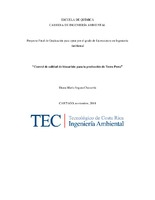Control de calidad de biocarbón para la producción de Terra Preta
Resumen
The development of agricultural methods that increase crop productivity and improve the quality of soils in a sustainable manner, is essential nowadays due to the high degradation of soils. The proposal presented here is the use of biochar for its subsequent mixing in the production of Terra Preta, as an organic soil improver. However, due to the variability in the physicochemical properties of biochar, coming mainly from biomass and production temperature, heterogeneous qualities are obtained, making it difficult to understand the benefits it can offer when used as soil amendment. Therefore, in the present study physicochemical laboratory tests were carried out on biochars obtained from construction waste (pine) and bamboo biomass (Guadua angustifolia var. Sur): cation exchange capacity (CEC), hydrophobicity, water available for plants from dosages of 5 and 10 %, are some of the most important tests, together with an analysis of environmental and socioeconomic sustainability. The results obtained from the physicochemical tests are favorable for both biomasses; however, the bamboo biochar showed better results in general, as it was in the CEC with a value of 19.97 cmolc / kg as the maximum value obtained in the biochars, corresponding to the first carbonization. On the other hand, the hydrophobicity is reduced in a shorter time for the bamboo tests. The retention of water available for the plants in the bamboo mixtures when using the 10 % dose, are favorable and presented a 72 % net retention for the first carbonization and 58 % for the third carbonization. Therefore, it is recommended to use bamboo biomass for the production of biochar, due to the physicochemical properties obtained and the sustainability analysis carried out with respect to the versatility of application, environmental and socioeconomic benefits. From the proposed carbonizer, a production yield of 26 % can be achieved, at the same time reduce operational costs, since it is expected to save ₡ 820 750, respect to the production of biochar obtained in the present study.
Descripción
Proyecto Final de Graduación (Licenciatura en Ingeniería Ambiental) Instituto Tecnológico de Costa Rica, Escuela de Química, Carrera de Ingeniería Ambiental, 2018.


